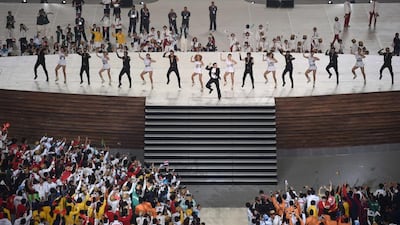Asian Games competition begins in 20 sports on Saturday at Incheon, South Korea, but the prospect of empty stadiums and high debt for many years is already making the continent’s biggest sporting event feel unloved.
Much has been made of the US$32 billion (Dh117.5bn) in debt generated when the Chinese city of Guangzhou staged the Games four years ago.
Other Asian nations now appear leery of the planet’s second-biggest sports event after the Summer Olympics.
Yesterday, the Olympic Council of Asia executive board chose Indonesia to hold the 2018 Games after Vietnam withdrew this year, citing high costs.
There were no other candidates.
The mayor of South Korea’s third city admitted ahead of opening ceremonies last night that Incheon is in financial trouble over the cost, even for a Games billed as being low-cost.
Inhabitants are not convinced that the event, for which 17 new venues have been built for the sporting stars from across Asia, is worth it.
There is no queue of countries at the Olympic Council of Asia to put on future Asiads, which means hosting nearly 10,000 athletes and thousands of coaches, officials and journalists.
There were fewer than 100 people in the 41,000-seat Goyang Stadium when Jordan’s football team beat the UAE, silver medallists in the Asian Games four years ago, on Thursday night.
Thousands of tickets were on sale yesterday for the opening extravaganza in a 62,000-seat stadium.
Incheon officials said that barely 18 per cent of tickets have been sold for the Games, which run until October 4.
The city has since decided to report only ticket receipts, rather than numbers sold. A city spokeswoman, Yoo Ji-hyun, said on Friday that overall, the games had reached 55 per cent of its 35 billion won target.
Tens of thousands of tickets remain for the October 4 closing ceremony, which Yoo said had reached about 20 per cent of its financial target.
Yoo said that the number of seats sold was much lower than the sales targets, but insisted that interest is growing and there is a “visible rise in ticket sales”.
Yoo Jeong-bok, the city’s mayor, acknowledged the financial pain. He said North Korea’s decision to withdraw their female cheerleaders – widely admired in the south, despite the decades of frosty rivalry – was a blow.
“The North Korean cheerleaders would have contributed much to our show and also to improving relations between the two Koreas,” Yoo told the Yonhap national news agency.
“It’s true our financial burden has increased due to the Asian Games. However, I believe it will raise the brand value of our city” and attract foreign investors, he said.
The Games have cost nearly $2bn, and Incheon is now South Korea’s most-indebted city.
There are new tower blocks, a metro line, and sparkling sports facilities
Inhabitants say there is little sign of the 200,000 visitors that organisers counted on.
Asiad kicks off with ‘Gangnam Style’
The pop star Psy kicked off the Asian Games “Gangnam Style” in an energetic, K-Pop-fuelled ceremony on Friday night in which North Korean athletes received loud cheers from South Korean fans.
Spectators and athletes alike joined in Psy’s signature horse-riding dance as the singer belted out an electrifying rendition of his hit at Incheon’s 61,000-seat stadium.
Wearing a glittering black suit and backed by a team of dancers, the star brought the three-hour spectacle to a thumping finale, heralding the start of 15 days of competition with 9,500 athletes.
Park Geun-hye, South Korea’s president, opened the 17th edition of the Olympics-style event, after athletes from 45 countries, including 88 from the UAE, had filed into the stadium.
Actress Lee Young-ae, the star of hit Korean drama Dae Jang Geum, lit the Games’ ceremonial flame, helped by two children.
The ceremony’s most touching moment came when the crowd bellowed their approval for the team from North Korea, with which South Korea technically remains at war.
The North’s athletes and officials, in pristine white blazers and blue trousers, gave only the slightest of grins as they paraded.
There were also big cheers for Japan and China, allaying fears they could get a frosty reception because of tensions over Beijing’s long-standing support for Pyongyang and Tokyo’s colonial rule.
Organisers will hope the ceremony will inject some much-needed buzz into the Games.
Even the showcase opening, where top-price tickets cost $1,000, failed to draw a capacity crowd, with hundreds of seats still empty at the start of the spectacle.
The hosts will be desperate for a good early showing by their athletes to attract local fans and the pressure will be on Jung Jee-hae, who is favourite for the Games’ first gold, in the women’s 10-metre air pistol on Saturday.
Olympic Council encourages Saudis to promote female athletes
The Olympic Council of Asia president, Sheikh Ahmad Al Fahad, said the body is “encouraging” Saudi Arabia to put forward female athletes in the future after bringing 202 men and no women to the Asian Games in South Korea, which the group, Human Rights Watch, called a “backwards step”. The Saudis took two women to the London 2012 Olympics.
Follow us on twitter at @SprtNationalUAE

